Palmarès de Lance Armstrong - Résultats et classements
Palmarès sur le tour de france.
- 7 fois vainqueur du Tour de France ( 2005 *, 2004 *, 2003 *, 2002 *, 2001 *, 2000 *, 1999 *)
- 22 étapes du Tour de France (1 en 1993 , 1 en 1995 , 4 en 1999 *, 1 en 2000 *, 4 en 2001 *, 4 en 2002 *, 1 en 2003 *, 5 en 2004 *, 1 en 2005 *)
- 8 top 10 du Tour de France (3è en 2009 *, 1er en 2005 *, 1er en 2004 *, 1er en 2003 *, 1er en 2002 *, 1er en 2001 *, 1er en 2000 *, 1er en 1999 *)

Autres palmarès
- Paris-Nice (2è en 1996)
- Amstel Gold Race (2è en 1999*, 2è en 2001*)
- Liège-Bastogne-Liège (2è en 1994, 2è en 1996)
- Critérium du Dauphiné (3è en 2000*, 1er en 2002*, 1er en 2003*)
- Tour de Suisse (1er en 2001*, 2è en 2010*)
- Flèche wallonne (1er en 1996)
- Classique de Saint-Sébastien (2è en 1994, 1er en 1995)
- Championnat de Zurich (2è en 1992, 3è en 2002)
Top 10 dans les étapes du Tour de France
61 Top 10 dans les étapes du Tour de France.
*Disqualifié
- Palmarès des compétitions
- Classements européens
- Fiches et palmarès des clubs
- Coupe du Monde
- Championnat d'Europe (Euro)
- Copa America
- Coupe d'Afrique des Nations (CAN)
- Coupe d'Asie des Nations
- Coupe des confédérations
- Chants de supporters
- Buts en vidéo
- Biographies de joueurs
- Tour de France : tous les résultats et classements
- Palmarès du Vendée Globe
- Palmarès de la Route du Rhum
- Palmarès de la Transat anglaise
- Palmarès de la Transat Jacques Vabre
- Palmarès de la Coupe du monde
- Palmarès du Tournoi des 6 nations
- Palmarès de la Coupe d'Europe
- Palmarès du Top 14
- Palmarès du Challenge européen
- Football américain
- Sport Automobile
- Tour de France
- Giro d'Italia
- La Vuelta ciclista a España
- World Championships
- Amstel Gold Race
- Milano-Sanremo
- Tirreno-Adriatico
- Liège-Bastogne-Liège
- Il Lombardia
- La Flèche Wallonne
- Paris - Nice
- Paris-Roubaix
- Volta Ciclista a Catalunya
- Critérium du Dauphiné
- Tour des Flandres
- Gent-Wevelgem in Flanders Fields
- Clásica Ciclista San Sebastián
- INEOS Grenadiers
- Groupama - FDJ
- EF Education-EasyPost
- Decathlon AG2R La Mondiale Team
- BORA - hansgrohe
- Bahrain - Victorious
- Astana Qazaqstan Team
- Intermarché - Wanty
- Lidl - Trek
- Movistar Team
- Soudal - Quick Step
- Team dsm-firmenich PostNL
- Team Jayco AlUla
- Team Visma | Lease a Bike
- UAE Team Emirates
- Arkéa - B&B Hotels
- Alpecin-Deceuninck
- Grand tours
- Countdown to 3 billion pageviews
- Favorite500
- Profile Score
- Statistics by season
- World map of rider races
- Most starts by race
- Starts and results
- Injury history
- Contribute info
- Submit program
- Contribute sites / social media
- Embed rider results
- Top GC results
- Overview - Overview
- Statistics - Statistics
- Results - Results
- Calendar - Calendar
- More - More
- Specialties - Specialties
Lance Armstrong
- Professional wins
- Type wins All Stages Classics Time trials GC
- Including stripped results (
Follow-up links
- Victory ranking
- Biggest, longest, ...
- By vertical meters
- Solo victories
- Top classic results
- Key career stats
- Podium statistics
- % of team points
- Current standings
- Top achievements tick-off
- Career points
- Most underestimated
- Points per race
- Most scored result
- GC time won/lost
- Classics vs GC
- Best PCS National results
- Never competed in
- Racedays per BIB
- Races per country
- KMs by nation
- KMs by race
- Race distance
- Attack kilometres
- Leader jerseys
- Results per parcours type
- Best stage results
- Last attacks
- LiveStats mentions
- Last recorded crashes
- Votes per nation
- All time teammates
- Teammate most raced with
- Most 1-day profile views
- Rider most raced with
- Hits per day
- Points per season part
- Rest periods
- KOM sprints won
Grand Tours
- Vuelta a España
Major Tours
- Volta a Catalunya
- Tour de Romandie
- Tour de Suisse
- Itzulia Basque Country
- Milano-SanRemo
- Ronde van Vlaanderen
Championships
- European championships
Top classics
- Omloop Het Nieuwsblad
- Strade Bianche
- Gent-Wevelgem
- Dwars door vlaanderen
- Eschborn-Frankfurt
- San Sebastian
- Bretagne Classic
- GP Montréal
Popular riders
- Tadej Pogačar
- Wout van Aert
- Remco Evenepoel
- Jonas Vingegaard
- Mathieu van der Poel
- Mads Pedersen
- Primoz Roglic
- Demi Vollering
- Lotte Kopecky
- Katarzyna Niewiadoma
- PCS ranking
- UCI World Ranking
- Points per age
- Latest injuries
- Youngest riders
- Grand tour statistics
- Monument classics
- Latest transfers
- Favorite 500
- Points scales
- Profile scores
- Reset password
- Cookie consent
About ProCyclingStats
- Cookie policy
- Contributions
- Pageload 0.0206s
- History Classics
- Your Profile
- Find History on Facebook (Opens in a new window)
- Find History on Twitter (Opens in a new window)
- Find History on YouTube (Opens in a new window)
- Find History on Instagram (Opens in a new window)
- Find History on TikTok (Opens in a new window)
- This Day In History
- History Podcasts
- History Vault
This Day In History : October 22
Changing the day will navigate the page to that given day in history. You can navigate days by using left and right arrows
Cyclist Lance Armstrong is stripped of his seven Tour de France titles

On October 22, 2012, Lance Armstrong is formally stripped of the seven Tour de France titles he won from 1999 to 2005 and banned for life from competitive cycling after being charged with systematically using illicit performance-enhancing drugs and blood transfusions as well as demanding that some of his Tour teammates dope in order to help him win races. It was a dramatic fall from grace for the onetime global cycling icon, who inspired millions of people after surviving cancer then going on to become one of the most dominant riders in the history of the grueling French race, which attracts the planet’s top cyclists.
Born in Texas in 1971, Armstrong became a professional cyclist in 1992 and by 1996 was the number-one ranked rider in the world. However, in October 1996 he was diagnosed with Stage 3 testicular cancer, which had spread to his lungs, brain and abdomen. After undergoing surgery and chemotherapy, Armstrong resumed training in early 1997 and in October of that year joined the U.S. Postal Service cycling team. Also in 1997, he established a cancer awareness foundation. The organization would famously raise millions of dollars through a sales campaign, launched in 2004, of yellow Livestrong wristbands.
In July 1999, to the amazement of the cycling world and less than three years after his cancer diagnosis, Armstrong won his first Tour de France. He was only the second American ever to triumph in the legendary, three-week race, established in 1903. (The first American to do so was Greg LeMond, who won in 1986, 1989 and 1990.) Armstrong went on to win the Tour again in 2000, 2001, 2002 and 2003. In 2004, he became the first person ever to claim six Tour titles, and on July 24, 2005, Armstrong won his seventh straight title and retired from pro cycling. He made a comeback to the sport in 2009, finishing third in that year’s Tour and 23rd in the 2010 Tour, before retiring for good in 2011 at age 39.
Throughout his career, Armstrong, like many other top cyclists of his era, was dogged by accusations of performance-boosting drug use, but he repeatedly and vigorously denied all allegations against him and claimed to have passed hundreds of drug tests. In June 2012, the U.S. Anti-Doping Agency (USADA), following a two-year investigation, charged the cycling superstar with engaging in doping violations from at least August 1998, and with participating in a conspiracy to cover up his misconduct. After losing a federal appeal to have the USADA charges against him dropped, Armstrong announced on August 23 that he would stop fighting them. However, calling the USADA probe an “unconstitutional witch hunt,” he continued to insist he hadn’t done anything wrong and said the reason for his decision to no longer challenge the allegations was the toll the investigation had taken on him, his family and his cancer foundation. The next day, USADA announced Armstrong had been banned for life from competitive cycling and disqualified of all competitive results from August 1, 1998, through the present.
On October 10, 2012, USADA released hundreds of pages of evidence—including sworn testimony from 11 of Armstrong’s former teammates, as well as emails, financial documents and lab test results—that the anti-doping agency said demonstrated Armstrong and the U.S. Postal Service team had been involved in the most sophisticated and successful doping program in the history of cycling. A week after the USADA report was made public, Armstrong stepped down as chairman of his cancer foundation and was dumped by a number of his sponsors, including Nike, Trek and Anheuser-Busch.On October 22, Union Cycliste Internationale (UCI), the cycling’s world governing body, announced that it accepted the findings of the USADA investigation and officially was erasing Armstrong’s name from the Tour de France record books and upholding his lifetime ban from the sport. In a press conference that day, the UCI president stated: “Lance Armstrong has no place in cycling, and he deserves to be forgotten in cycling.”
After years of denials, Armstrong finally admitted publicly, in a televised interview with Oprah Winfrey that aired on January 17, 2013, he had doped for much of his cycling career, beginning in the mid-1990s through his final Tour de France victory in 2005. He admitted to using a performance-enhancing drug regimen that included testosterone, human growth hormone, the blood booster EPO and cortisone.
Also on This Day in History October | 22
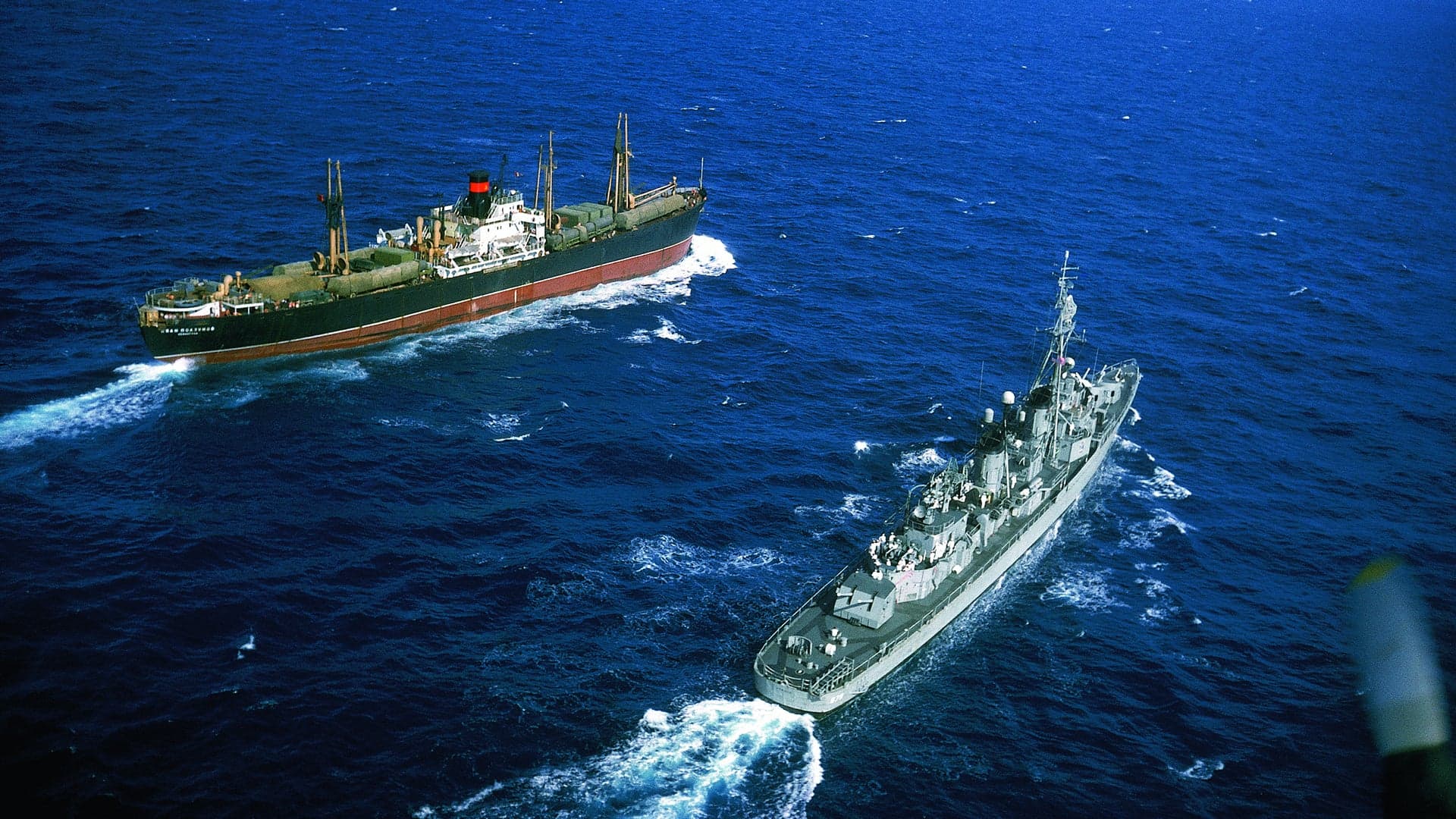
This Day in History Video: What Happened on October 22
First parachute jump is made over paris, gay sergeant challenges the air force.
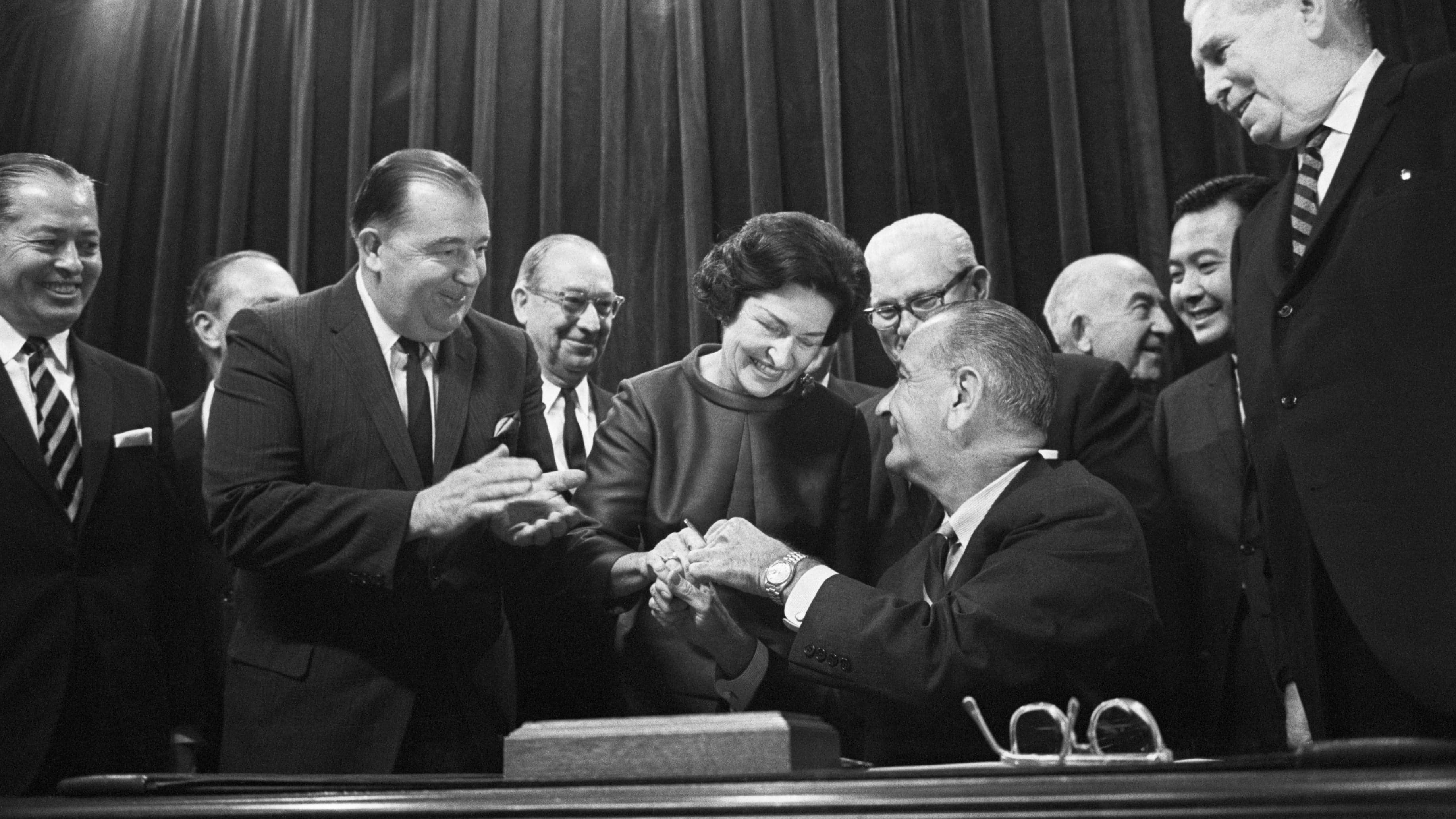
President Lyndon Johnson signs the Highway Beautification Act
Jfk’s address on cuban missile crisis shocks the nation, germans capture langemarck during first battle of ypres.
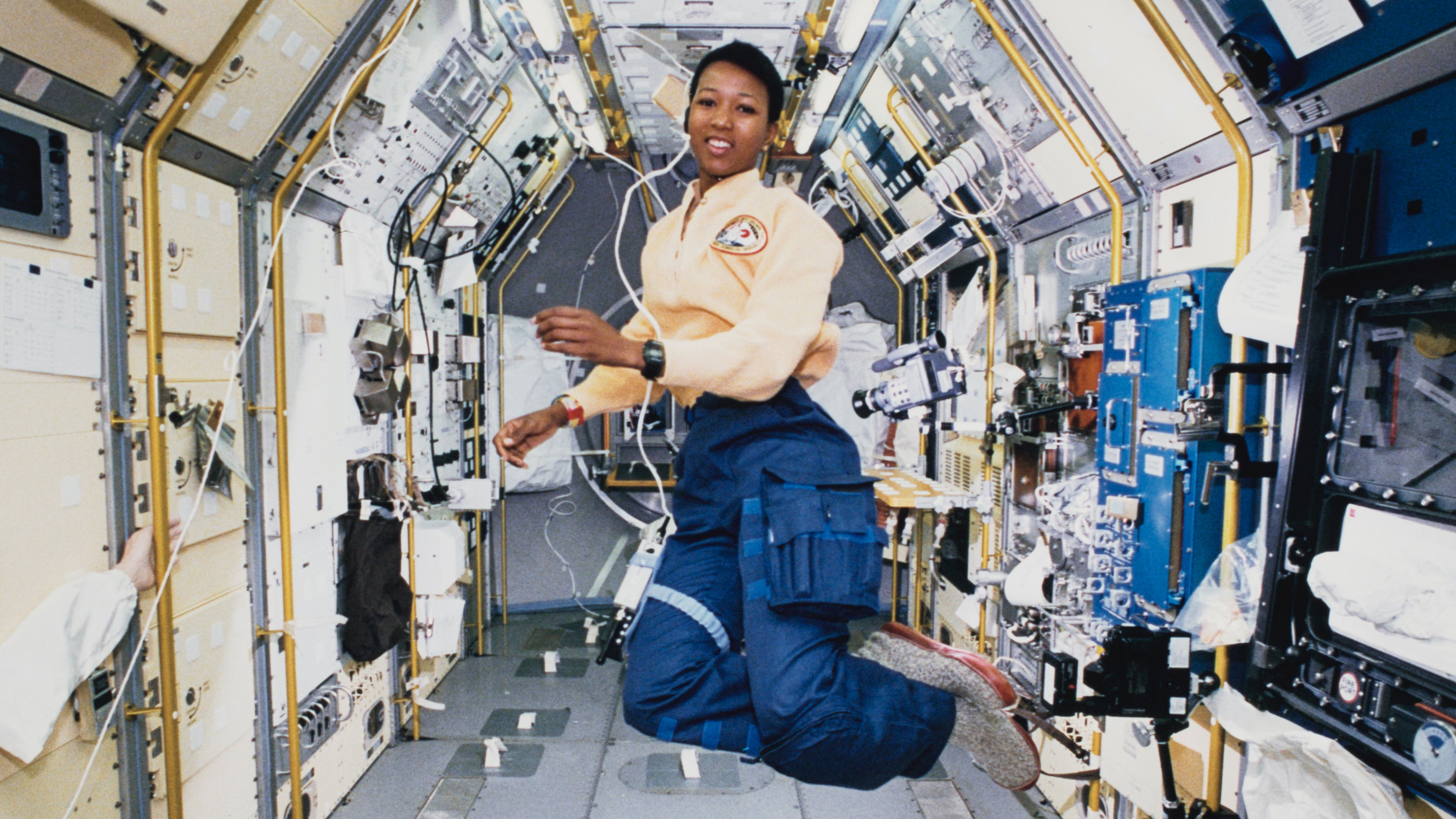
Wake Up to This Day in History
Sign up now to learn about This Day in History straight from your inbox. Get all of today's events in just one email featuring a range of topics.
By submitting your information, you agree to receive emails from HISTORY and A+E Networks. You can opt out at any time. You must be 16 years or older and a resident of the United States.
More details : Privacy Notice | Terms of Use | Contact Us
South Vietnamese President Thieu turns down peace proposal
American forces suffer first casualties in vietnam, jean-paul sartre wins and declines nobel prize in literature, fbi agents kill fugitive “pretty boy” floyd, 173rd airborne trooper dives onto live grenade, saving comrades.
Lance Armstrong wins seventh consecutive and last Tour de France
Lance Armstrong closed out his amazing career with a seventh consecutive Tour de France victory today — and did it a little earlier than expected.
Share story
PARIS — Lance Armstrong closed out his amazing career with a seventh consecutive Tour de France victory today — and did it a little earlier than expected. Because of wet conditions, race organizers stopped the clock as Armstrong and the main pack entered Paris. Although riders were still racing, with eight laps of the Champs-Elysees to complete, organizers said that Armstrong had officially won. The stage started as it has done for the past six years — with Armstrong celebrating and wearing the race leader’s yellow jersey. One hand on his handlebars, the other holding a flute of champagne, Armstrong toasted his teammates as he pedaled into Paris to collect his crown. He held up seven fingers — one for each win — and a piece of paper with the number 7 on it. When it was over, Armstrong saluted the race he’s made his own. “Vive le Tour, forever,” he said. Armstrong choked up on the victory podium as he stood next to his twin 3-year-old daughters — dressed in bright yellow dresses, appropriately — and his son. His rock star girlfriend Sheryl Crow, wearing a yellow halter top, cried during the ceremony. “This is the way he wanted to finish his career, so it’s very emotional,” she said. Looking gaunt, his cheeks hollow after riding 2,232.7 miles across France and its mountains for three weeks, Armstrong still could smile at the end. He said President Bush called to congratulate him. Armstrong’s new record of seven wins confirmed him as one of the greatest cyclists ever, and capped a career where he came back from cancer to dominate cycling’s most prestigious and taxing race. Standing on the podium, against the backdrop of the Arc de Triomphe, Armstrong managed a rare feat in sports — going out on the top of his game. He previously said that his decision was final and that he was walking away with “absolutely no regrets.” Armstrong mentioned Tiger Woods, Wayne Gretzky, Michael Jordan and Andre Agassi as personal inspirations. “Those are guys that you look up to you, guys that have been at the top of their game for a long time,” he said. As for his accomplishments, he said, “I can’t be in charge of dictating what it says or how you remember it.” “In five, 10, 15, 20 years, we’ll see what the legacy is. But I think we did come along and revolutionize the cycling part, the training part, the equipment part. We’re fanatics.” Alexandre Vinokourov of Kazakhstan eventually won the final stage, with Armstrong finishing safely in the pack to win the Tour by more than 4 minutes, 40 seconds over Ivan Basso of Italy. The 1997 Tour winner, Jan Ullrich, was third, 6:21 back. “It’s up to you guys,” Armstrong said, forecasting the Tour future. Armstrong’s sixth win last year already set a record, putting Armstrong ahead of four other riders — Frenchmen Jacques Anquetil and Bernard Hinault, Belgian Eddy Merckx and Spaniard Miguel Indurain — who all won five Tours. Along the way, he brought unprecedented attention to the sport, and won over many who had dismissed it. “Finally, the last thing I’ll say for the people who don’t believe in cycling — the cynics, the skeptics — I’m sorry for you,” Armstrong said. “I’m sorry you can’t dream big and I’m sorry you don’t believe in miracles. But this is one hell of a race, this is a great sporting event and you should stand around and believe.” Armstrong’s last ride as a professional — the closing 89.8-mile 21st stage into Paris from Corbeil-Essonnes south of the capital — was not without incident. Three of his teammates slipped and crashed on the rain-slicked pavement coming around a bend just before they crossed the River Seine. Armstrong, right behind them, braked and skidded into the fallen riders. Armstrong used his right foot to steady himself, and was able to stay on the bike. His teammates, wearing special shirts with a band of yellow on right shoulder, recovered and led him up the Champs-Elysees at the front of the pack. Organizers then announced that they had stopped the clock because of the slippery conditions with more than 10 miles to go. Vinokourov surged ahead of the main pack to win the last stage. He had been touted as one of Armstrong’s main rivals at the start of the Tour on July 2, but like others was overwhelmed by the 33-year-old Texan. Armstrong’s departure begins a new era for the 102-year-old Tour, with no clear successor. His riding and his inspiring defeat of cancer attracted new fans — especially in the United States — to the race, as much a part of French summers as sun cream, forest fires and traffic jams down to the Cote d’Azur. Millions turned out each year, cheering, picnicking and sipping wine by the side of the road, to watch him flash past in the race leader’s yellow jersey, the famed “maillot jaune.” Cancer survivors, autograph hunters and enamored admirers pushed, shove, and yelled “Lance! Lance!” outside his bus in the mornings for a smile, a signature, or a word from the champion. He had bodyguards to keep the crowds at bay — ruffling feathers of cycling purists who sniffed at his “American” ways. Some spectators would shout obscenities or “dope!” — doper. To some, his comeback from cancer and his uphill bursts of speed that left rivals gasping in the Alps and Pyrenees were too good to be true. Armstrong insisted that he simply trained, worked and prepared harder than anyone. He was drug-tested hundreds of times, in and out of competition, but never found to have committed any infractions. Armstrong came into this Tour saying he had a dual objective — winning the race and the hearts of French fans. He was more relaxed, forthcoming and talkative than last year, when the pressure to be the first six-time winner was on. Some fans hung the Stars and Stripes on barriers that lined the Champs-Elysees on Sunday. Around France, some also urged Armstrong to go for an eighth win next year— holding up placards and daubing their appeals in paint on the road. Armstrong, however, wanted to go out on top — and not let advancing age get the better of him. “At some point you turn 34, or you turn 35, the others make a big step up, and when your age catches up, you take a big step down,” he said Saturday after he won the final time trial. “So next could be the year if I continued that I lose that five minutes. We are never going to know.”
Lance Armstrong
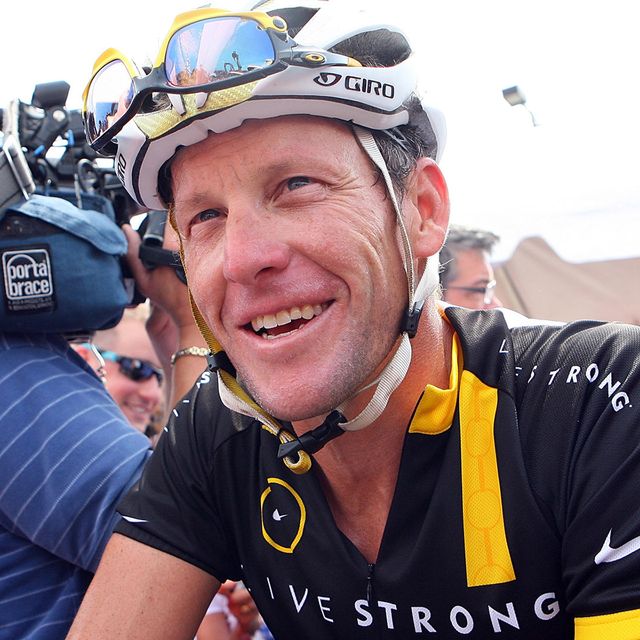
Who Is Lance Armstrong?
Lance Armstrong became a triathlete before turning to professional cycling. His career was halted by testicular cancer, but Armstrong returned to win a record seven consecutive Tour de France races beginning in 1999. Stripped of those titles in 2012 due to evidence of performance-enhancing drug use, Armstrong in 2013 admitted to doping throughout his cycling career, following years of denials.
Early Career
Born on September 18, 1971, in Plano, Texas, Armstrong was raised by his mother, Linda, in the suburbs of Dallas, Texas. Armstrong was athletic from an early age. He began running and swimming at 10 years old, and took up competitive cycling and triathlons at 13. At 16, Armstrong became a professional triathlete—he was the national sprint-course triathlon champion in 1989 and 1990.
Soon after, Armstrong chose to focus on cycling, his strongest event as well as his favorite. During his senior year of high school, the U.S. Olympic development team invited him to train in Colorado Springs, Colorado. Armstrong left high school temporarily to do so, but later took private classes and received his high school diploma in 1989.
The following summer, he qualified for the 1990 junior world team and placed 11th in the World Championship Road Race, with the best time of any American since 1976. That same year, he became the U.S. national amateur champion and beat out many professional cyclists to win two major races, the First Union Grand Prix and the Thrift Drug Classic.
International Cycling Star
In 1991, Armstrong competed in his first Tour DuPont, a long and difficult 12-stage race, covering 1,085 miles over 11 days. Though he finished in the middle of the pack, his performance announced a promising newcomer to the world of international cycling. He went on to win a stage at Italy's Settimana Bergamasca race later that summer.
After finishing second in the U.S. Olympic time trials in 1992, Armstrong was favored to win the road race in Barcelona, Spain. With a surprisingly sluggish performance, however, he came in only 14th. Undeterred, Armstrong turned professional immediately after the Olympics, joining the Motorola cycling team for a respectable yearly salary. Though he came in dead last in his first professional event, the day-long San Sebastian Classic in Spain, he rebounded in two weeks and finished second in a World Cup race in Zurich, Switzerland.
Armstrong had a strong year in 1993, winning cycling's "Triple Crown"—the Thrift Drug Classic, the Kmart West Virginia Classic and the CoreStates Race (the U.S. Professional Championship). That same year, he came in second at the Tour DuPont. He started off well in his first-ever Tour de France, a 21-stage race that is widely considered cycling's most prestigious event. Though he won the eighth stage of the race, he later fell to 62nd place and eventually pulled out.
In August 1993, the 21-year-old Armstrong won his most important race yet: the World Road Race Championship in Oslo, Norway, a one-day event covering 161 miles. As the leader of the Motorola team, he overcame difficult conditions—pouring rain made the roads slick and caused him to crash twice during the race—to become the youngest person and only the second American ever to win that contest.
The following year, he was again the runner-up at the Tour DuPont. Frustrated by his near miss, he trained with a vengeance for the next year's event and went on to finish two minutes ahead of rival Viatcheslav Ekimov of Russia for the win. At the Tour DuPont in 1996, he set several event records, including the largest margin of victory (three minutes, 15 seconds) and the fastest average speed in a time trial (32.9 miles per hour).
Also in 1996, Armstrong rode again for the Olympic team in Atlanta, Georgia. Looking uncharacteristically fatigued, he finished sixth in the time trials and 12th in the road race. Earlier that summer, he had been unable to finish the Tour de France, as he was sick with bronchitis. Despite such setbacks, Armstrong was still riding high by the fall of 1996. Then the seventh-ranked cyclist in the world, he signed a lucrative contract with a new team, France's Team Cofidis.
Battling Testicular Cancer
In October 1996, however, came the shocking announcement that Armstrong had been diagnosed with testicular cancer. Well advanced, the tumors had spread to his abdomen, lungs and lymph nodes. After having a testicle removed, drastically modifying his eating habits and beginning aggressive chemotherapy, Armstrong was given a 65 to 85 percent chance of survival. When doctors found tumors on his brain, however, his odds of survival dropped to 50-50, and then to 40 percent. Fortunately, a subsequent surgery to remove his brain tumors was declared successful, and after more rounds of chemotherapy, Armstrong was declared cancer-free in February 1997.
Throughout his terrifying struggle with the disease, Armstrong continued to maintain that he was going to race competitively again. No one else seemed to believe in him, however, and Cofidis pulled the plug on his contract and $600,000 annual salary. As a free agent, he had a good deal of trouble finding a sponsor, finally signing on to a $200,000-per-year position with the United States Postal Service team.
Tour de France Dominance
At the 1998 Tour of Luxembourg, his first international race since returning from cancer, Armstrong showed he was up for the challenge by winning the opening stage. A little over a year later, he capped his comeback in grand style by becoming the second American, after Greg LeMond, to win the Tour de France. He repeated that feat in July 2000 and followed with a bronze medal at the Summer Olympic Games.
Armstrong bolstered his legacy as his generation's dominant rider by handily winning the Tour in 2001 and 2002. However, notching a fifth victory, tying the record held by Jacques Anquetil, Eddy Merckx, Bernard Hinault and Miguel Indurain, proved his most difficult accomplishment. Stricken by illness before the start of the race, Armstrong fell at one point after snagging a spectator's bag, and barely avoided another crash by swerving across a field. He finished one minute and one second ahead of Germany's Jan Ullrich, the closest of his Tour triumphs.
Armstrong was back in top form to claim his record-breaking sixth Tour win in 2004. He won five individual stages, finishing a comfortable six minutes and 19 seconds ahead of Germany's Andreas Kloden. After capping his astounding run with a seventh consecutive Tour victory in 2005, he retired from racing.
Return to Competition
On September 9, 2008, Armstrong announced that he planned to return to competition and the Tour de France in 2009. A member of Team Astana, he placed third in the race, behind teammate Alberto Contador and Saxo Bank team member Andy Schleck.
After the race, Armstrong told reporters that he intended to compete again in 2010, with a new team endorsed by RadioShack. Slowed by multiple crashes, Armstrong finished 23rd overall in what would be his final Tour de France, and he announced he was retiring for good in February 2011.
Drug Controversy
Despite the inspiring narrative of Armstrong's triumph over cancer, not everyone was convinced it was valid. Irish sportswriter David Walsh, for one, became suspicious of Armstrong's behavior and sought to shed light on the rumors of drug use in the sport. In 2001, he wrote a story linking Armstrong to Italian doctor Michele Ferrari, who was being investigated for supplying performance enhancers to cyclists. Walsh later secured a confession from Armstrong's masseuse, Emma O'Reilly, and laid out his case against the American champion as co-writer of the 2004 book L.A. Confidential.
The plot thickened in 2010, when former U.S. Postal rider Floyd Landis, who had been stripped of his 2006 Tour de France win for drug use, admitted to doping and accused his celebrated teammate of doing the same. That prompted a federal investigation, and in June 2012 the U.S Anti-Doping Agency brought formal charges against Armstrong. The case heated up in July 2012, when some media outlets reported that five of Armstrong's former teammates, George Hincapie, Levi Leipheimer, David Zabriskie and Christian Vande Velde—all of whom participated in the 2012 Tour de France—were planning to testify against Armstrong.
The cycling champion vehemently denied using illegal drugs to boost his performance, and the 2012 USADA charges were no exception: He disparaged the new allegations, calling them "baseless." On August 23, 2012, Armstrong publicly announced that he was giving up his fight with the USADA's recent charges and that he had declined to enter arbitration with the agency because he was tired of dealing with the case, along with the stress the case created for his family.
"There comes a point in every man's life when he has to say, 'Enough is enough.' For me, that time is now," Armstrong said in an online statement around that time. "I have been dealing with claims that I cheated and had an unfair advantage in winning my seven Tours since 1999. The toll this has taken on my family and my work for our foundation and on me leads me to where I am today—finished with this nonsense."
Banned From Cycling
The following day, on August 24, 2012, the USADA announced that Armstrong would be stripped of his seven Tour titles—as well as other honors he received from 1999 to 2005—and banned from cycling for life. The agency concluded in its report that Armstrong had used banned performance-enhancing substances. On October 10, 2012, the USADA released its evidence against Armstrong, which included documents such as laboratory tests, emails and monetary payments. "The evidence shows beyond any doubt that the U.S. Postal Service Pro Cycling Team ran the most sophisticated, professionalized and successful doping program that the sport had ever seen," Travis Tygart, chief executive of the USADA, said in a statement.
The USADA evidence against Armstrong also contained testimony from 26 people. Several former members of Armstrong's cycling team were among those who claimed that Armstrong used performance-enhancing drugs and served as a type of a ringleader for the team's doping efforts. According to The New York Times , one teammate told the agency that "Lance called the shots on the team" and "what Lance said went."
Armstrong disputed the USADA's findings. His attorney, Tim Herman, called the USADA's case "a one-sided hatchet job" featuring "old, disproved, unreliable allegations based largely on axe-grinders, serial perjurers, coerced testimony, sweetheart deals and threat-induced stories," according to USA Today .
Shortly after the release of the USADA findings, the International Cycling Union (cycling's governing body) supported the USADA's decision and officially stripped Armstrong of his seven Tour de France victories. The union also banned Armstrong from the sport for life. ICU president Pat McQuaid said in a statement that "Lance Armstrong has no place in cycling."
Admission and Later Events
Of the interview, Winfrey said in a statement, "He did not come clean in the manner I expected. It was surprising to me. I would say that, for myself, my team, all of us in the room, we were mesmerized by some of his answers. I felt he was thorough. He was serious. He certainly prepared himself for this moment. I would say he met the moment. At the end of it, we both were pretty exhausted."
Around the same time that the interview was conducted, it was reported that the U.S. Department of Justice would join a lawsuit already in place against the cyclist, over his alleged fraud against the government. Armstrong's attempts to have the lawsuit dismissed were rejected, and in early 2017 the case was allowed to proceed to trial.
Fraud Settlement
In spring 2018, two weeks before his trial was scheduled to begin, Armstrong agreed to pay the U.S. Postal Service $5 million to settle their claims of being defrauded. According to his legal team, the settlement ended "all litigation against Armstrong related to his 2013 admission" of using performance-enhancing drugs.
"I am particularly glad to have made peace with the Postal Service," said Armstrong said in a statement. "While I believe that their lawsuit against me was without merit and unfair, I have since 2013 tried to take full responsibility for my mistakes, and make amends wherever possible. I rode my heart out for the Postal cycling team, and was always especially proud to wear the red, white and blue eagle on my chest when competing in the Tour de France."
Landis, the whistle-blower in the case, stood to receive $1.1 million of the amount paid to the government. Additionally, Armstrong agreed to shell out $1.65 million to cover his old teammate's legal expenses.
Movie and Documentaries
In 2015, the Armstrong biopic The Program , with Ben Foster portraying the fallen cyclist, premiered at the Toronto Film Festival. Armstrong had little to say about the film, other than criticizing its star for taking performance-enhancing drugs to prepare for the role.
Armstrong was far more receptive to the release of Icarus , a Netflix documentary in which amateur cyclist Bryan Fogel also pumps up on PEDs before uncovering a Russian state-sponsored system created to mask its athletes' use of such drugs. In late 2017, Armstrong tweeted: "After being asked roughly a 1000 times if I’ve seen @IcarusNetflix yet, I finally sat down to check it out. Holy hell. It’s hard to imagine that I could be blown away by much in that realm but I was. Incredible work @bryanfogel!"
It was subsequently announced that on January 6, 2018, the day after Academy Award voters could begin submitting their ballots, Armstrong would co-host a screening and reception for Icarus in New York.
The cyclist returned to the spotlight with the Marina Zenovich-directed documentary Lance , which premiered at the January 2020 Sundance Film Festival before airing on ESPN that May. Along with examining the formative influences that drove him to become such a ruthless competitor, the doc showcased Armstrong's attempts to adapt to public life in the years after he had fallen from his pedestal as one of the world's most admired athletes.
Charity, Personal Life and Children
Armstrong has lived in Austin, Texas, since 1990. In 1996, he founded the Lance Armstrong Foundation for Cancer, now called LiveStrong, and the Lance Armstrong Junior Race Series to help promote cycling and racing among America's youth. He is the author of two best-selling autobiographies, It's Not About the Bike: My Journey Back to Life (2000) and Every Second Counts (2003).
In 2006, Armstrong ran the New York City Marathon, raising $600,000 for his LiveStrong campaign. He stepped down from LiveStrong in October 2012 following the USADA report about his use of performance-enhancing drugs.
Armstrong married Kristin Richard, a public relations executive he met through his cancer foundation, in 1998. The couple had a son, Luke, in October 1999, using sperm frozen before Armstrong began chemotherapy. Twin daughters, Isabelle and Grace, were born in 2001. The couple filed for divorce in 2003. Afterward, he dated rocker Sheryl Crow , fashion designer Tory Burch and actresses Kate Hudson and Ashley Olsen .
In December 2008, Armstrong announced that his girlfriend, Anna Hansen, was pregnant with his child. The couple had been dating since July after meeting through Armstrong's charity work. The baby boy, Maxwell Edward, was born on June 4, 2009. A daughter, Olivia Marie, followed on October 18, 2010.
In July 2013, Armstrong made headlines again when it was reported that he would be competing in The Des Moines Register 's Annual Great Bicycle Ride Across Iowa, a statewide cycling race sponsored by the newspaper.
"I'm well aware my presence is not an easy topic, and so I encourage people if they want to give a high-five, great," Armstrong stated shortly after the news broke, according to the Daily Mail . "If you want to shoot me the bird, that's OK too. I'm a big boy, and so I made the bed, I get to sleep in it."
In 2015, Armstrong returned to the Tour de France course to ride in a leukemia charity event one day before the start of the race.
QUICK FACTS
- Name: Lance Armstrong
- Birth Year: 1971
- Birth date: September 18, 1971
- Birth State: Texas
- Birth City: Plano
- Birth Country: United States
- Gender: Male
- Best Known For: Lance Armstrong is a cancer survivor and former professional cyclist who was stripped of his seven Tour de France wins due to evidence of performance-enhancing drug use.
- Astrological Sign: Virgo
We strive for accuracy and fairness.If you see something that doesn't look right, contact us !
CITATION INFORMATION
- Article Title: Lance Armstrong Biography
- Author: Biography.com Editors
- Website Name: The Biography.com website
- Url: https://www.biography.com/athletes/lance-armstrong
- Access Date:
- Publisher: A&E; Television Networks
- Last Updated: April 23, 2021
- Original Published Date: April 2, 2014
- There comes a point in every man's life when he has to say, 'Enough is enough.' For me, that time is now.
- My ruthless desire to win at all costs served me well on the bike but the level it went to, for whatever reason, is a flaw. That desire, that attitude, that arrogance.
- The biggest challenge of the rest of my life is to not slip up again and not lose sight of what I have to do. I had it but things got too big and too crazy.
- If you're trying to hide something, you wouldn't keep getting away with it for 10 years. Nobody is that clever.
- I know the truth. The truth isn't what was out there. The truth isn't what I said, and now it's gone—this story was so perfect for so long.
- There was more happiness in the process, in the build, in the preparation. The winning was almost phoned in.
- If you're asking me if I want to compete again, the answer is hell yes, I'm a competitor.
- I learned a lesson that day. No more gifts."[On giving Marco Pantani a stage win in the 2000 Tour de France]
- The Look was just one part of a great battle with the Telekom team all day.
- Nobody believed I was able to do that after the crash. But I was a desperate man, and I knew that was my last chance to win the Tour de France.
- I'm well aware my presence is not an easy topic, and so I encourage people if they want to give a high-five, great. If you want to shoot me the bird, that's OK too. I'm a big boy, and so I made the bed, I get to sleep in it.
- I am deeply flawed ... and I'm paying the price for it, and I think that's okay. I deserve this."[On being stripped of his seven Tour de France titles for doping as a pro cyclist.]
- Two things scare me: The first is getting hurt. But that's not nearly as scary as the second, which is losing.
- Pain is temporary. It may last a minute, or an hour, or a day, or a year, but eventually it will subside and something else will take its place. If I quit, however, it lasts forever.
Famous Athletes
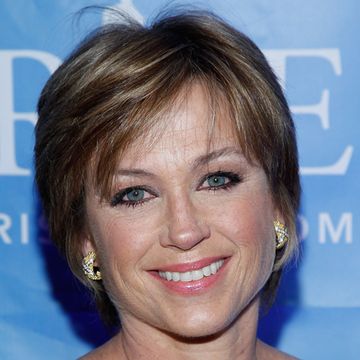
Jesse Owens
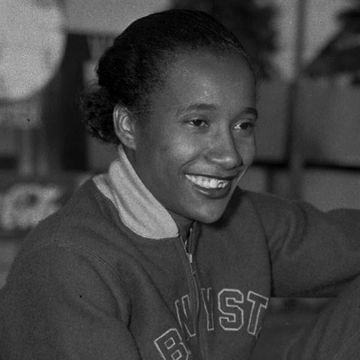
Alice Coachman
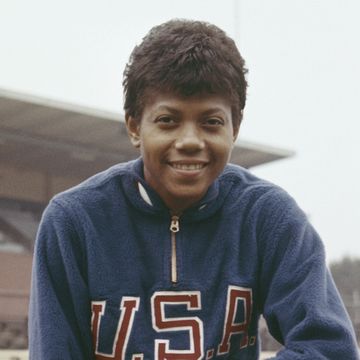
Wilma Rudolph
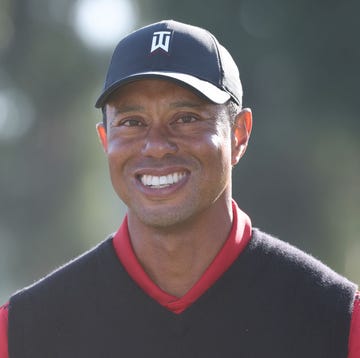
Tiger Woods
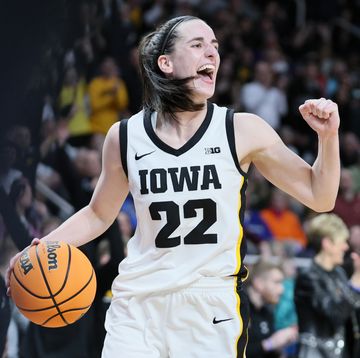
Caitlin Clark Prepares to Join the WNBA
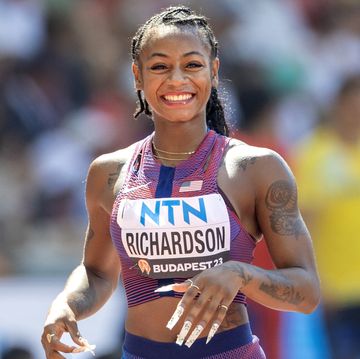
Sha’Carri Richardson
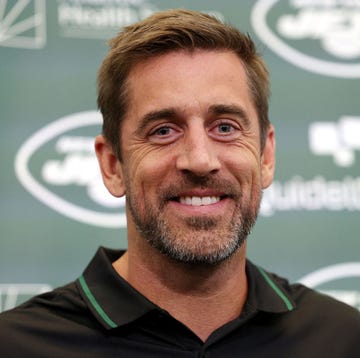
Aaron Rodgers
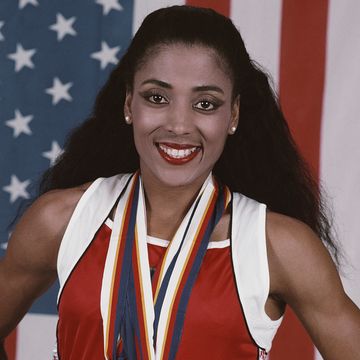
Florence Joyner
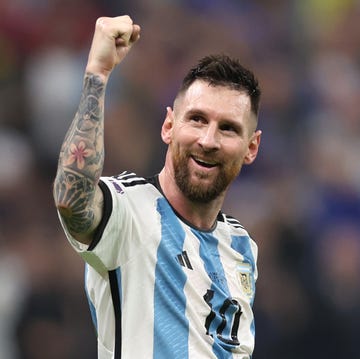
Lionel Messi
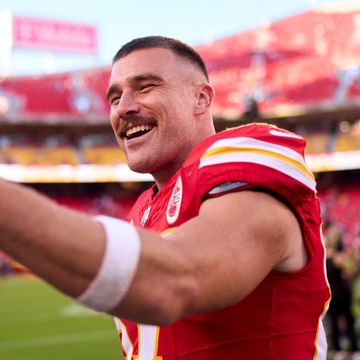
10 Things You Might Not Know About Travis Kelce
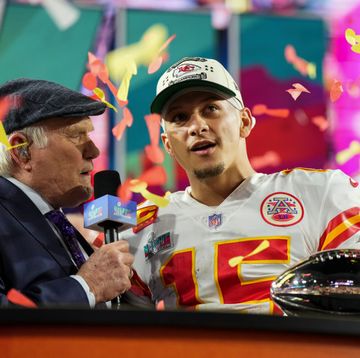
Every Black Quarterback to Play in the Super Bowl
In a final bid for Tour de France glory, Lance Armstrong had everything going for him—almost.

Bill Strickland is the Rider-in-Chief of Bicycling . His equal passions for cycling and writing have led to the books Ten Points: A Memoir ; Tour de Lance: The Extraordinary Story of Cycling’s Most Controversial Champion ; Mountain Biking: The Ultimate Guide to the Ultimate Ride ; and The Quotable Cyclist . His Bicycling story, “100 Pedal Strokes” won a National Magazine Award for Interactive Feature in 2008. In 2009, he assigned and edited the story “Broken,” which won the National Magazine Award for Public Interest. “The Escape,” the December, 2011, edition of his Bicycling magazine column The Pursuit, was named a Notable story by The Best American Sports Writing . Various editions of his books have been translated into Dutch, German, Hebrew, and Japanese. He uses commas by rhythm and sound, which is a terrible way to do it but makes him happy.

.css-1t6om3g:before{width:1.75rem;height:1.75rem;margin:0 0.625rem -0.125rem 0;content:'';display:inline-block;-webkit-background-size:1.25rem;background-size:1.25rem;background-color:#F8D811;color:#000;background-repeat:no-repeat;-webkit-background-position:center;background-position:center;}.loaded .css-1t6om3g:before{background-image:url(/_assets/design-tokens/bicycling/static/images/chevron-design-element.c42d609.svg);} Tour de France
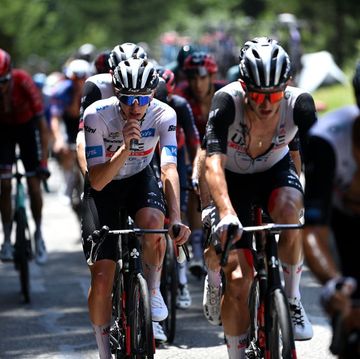
How Fast Do the Pros Ride in the Tour de France?
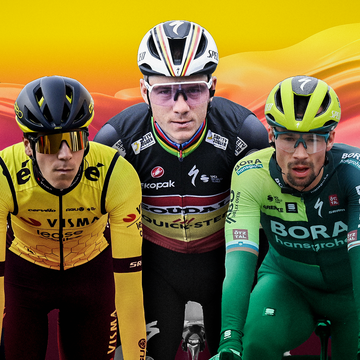
Challengers of the 2024 Giro d'Italia and TdF
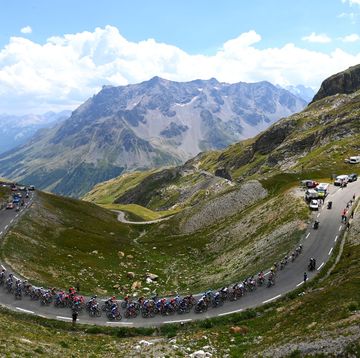
2024 Tour de France May Start Using Drones
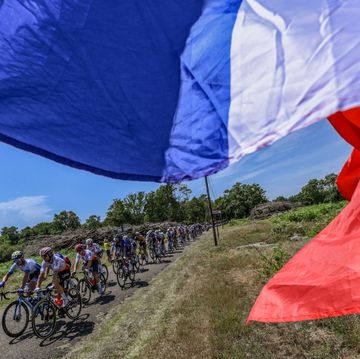
The 2024 Tour de France Can’t Miss Stages
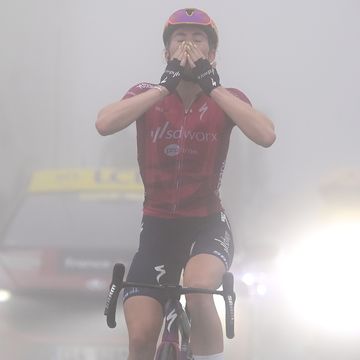
Riders Weigh In on the Tour de France Routes
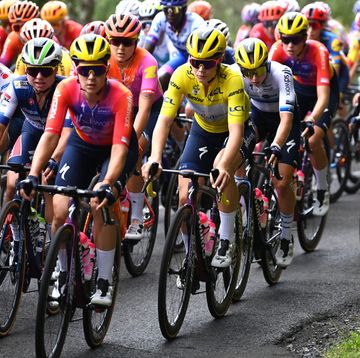
2024 Tour de France Femmes Can't-Miss Stages
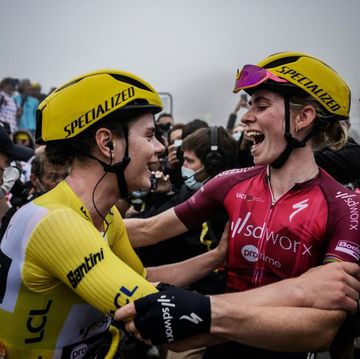
How Much Money Do Top Tour de France Teams Make?
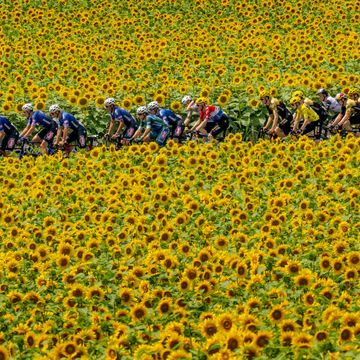
2024 Tour de France/ Tour de France Femmes Routes
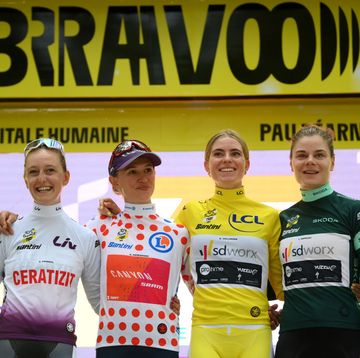
How Much Did Tour de France Femmes Riders Earn?
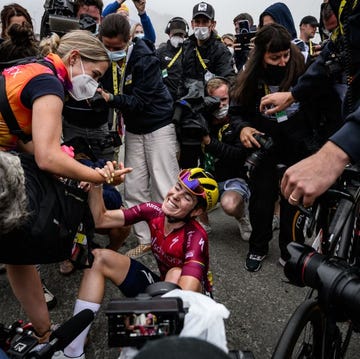
5 Takeaways from the Tour de France Femmes
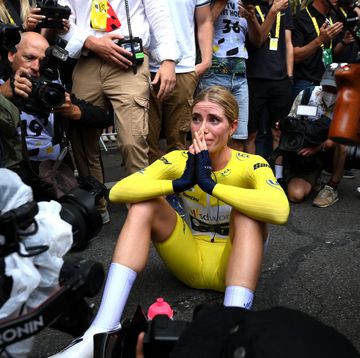
Who Won the 2023 Tour de France Femmes?
WHERE ARE THEY NOW? The Lance Armstrong team that dominated the Tour de France
Disgraced former American cyclist Lance Armstrong on Thursday settled federal fraud charges against him for $5 million. The charges were related to his use of performance-enhancing drugs during his professional racing career.
It ended a protracted legal battle that involved former teammate Floyd Landis and the US government on behalf of the US Postal Service, Armstrong's Tour de France team sponsor from 1999 through 2005. Landis had filed the original lawsuit — which had sought $100 million — in 2010 and is eligible for up to 25% of the settlement.
The deal came as the two sides prepared for a trial that was scheduled to start May 7 in Washington, The Associated Press reported. Armstrong said he was happy to have "made peace with the Postal Service."
For a decade, Armstrong was not only one of the world's most dominant athletes but one of its most recognizable figures. Armstrong did what no one had ever done: He won the Tour de France seven times, and he did so consecutively from 1999 to 2005.
But that was all before the US Anti-Doping Agency found that his team had run " the most sophisticated, professionalized and successful doping program that sport has ever seen."
As we know now, Armstrong used a variety of performance-enhancing drugs, and all his wins in the greatest bicycle race were eventually stripped from him.
As recently as 2016 Armstrong still blasted USADA , calling it "one of the most ineffective and inefficient organizations in the world" and claiming its CEO, Travis Tygart, went after him only because he needed a case and a story.
Armstrong didn't act alone, and it was, darkly so, a team effort. A calculating tactician, Le Boss handpicked his teammates carefully, and together they were cycling's most successful team.
Several of the riders who served under Armstrong's tainted reign are still involved in the sport.
Here's a look at what he and his old teammates have been up to:
An indelible image from the era was that of the US Postal Service's "Blue Train" setting a blistering pace at the front of the peloton, one that no one could match, let alone beat.
Levi Leipheimer was an all-rounder who rode with Armstrong on a few different teams at the Tour. He later admitted doping during his career.
Source: USADA
He now lives in Santa Rosa, California, where he runs a mass-participation bike ride. He also does promotion videos and coaches cyclists.
Sources: levination , Levi's GranFondo

Kevin Livingston was a climber who rode on two of Armstrong's Tour-winning teams. A French Senate report accused Livingston of using EPO in the 1998 Tour.
Sources: VeloNews , USADA
Livingston now lives in Austin, Texas, where he runs a company that coaches cyclists. It's located in the basement of Mellow Johnny's Bike Shop, which is owned by Armstrong.
Source: PedalHard.com
Tyler Hamilton helped Armstrong win Tours by leading him through the Alps and Pyrenees. He later admitted doping during his career.
Hamilton now lives in Missoula, Montana. He works in real estate and helps run a company that coaches cyclists. He also gives talks. He wrote a tell-all best-seller, "The Secret Race."
Sources: TylerHamilton Training.com , " The Secret Race "
George Hincapie was Armstrong's most loyal and trusted teammate and the only person to ride on all seven of Armstrong's Tour-winning teams. He admitted doping during his career.
He now lives in Greenville, South Carolina, where he runs a cycling-apparel company and a mass-participation bike ride. He wrote a book, "The Loyal Lieutenant," about his career.
Sources: GeorgeHincapie.com, " The Loyal Lieutenant "
Floyd Landis was an all-rounder who helped Armstrong win Tours and won one himself. He, too, was stripped of his Tour title because of PEDs.
In 2016 Landis started a business that sells cannabis products.
Related: Ex-Tour de France winner to open cannabis business, plans to go back to the Tour this July
Frankie Andreu was a cocaptain of the US Postal team with Armstrong in 1998, 1999, and 2000. He was one of the first riders to admit he had doped to help Armstrong win the Tour.
Sources: USADA , The New York Times
Andreu lives in the Detroit area and works in domestic cycling as a commentator.
Sources: FrankieAndreu.com , Business Insider
Related: Andreu: Lance 'is out to wreck me'
Christian Vande Velde rode on the first two of Armstrong's Tour-winning teams. He later admitted doping during his career.
Vande Velde lives in Greenville, South Carolina, and works as a cycling commentator for NBC.
Sources: christianvdv.com , Comcast , Chicago Tribune
Tom Danielson was hailed as "the next Lance Armstrong," and though he didn't race the Tour with Armstrong, they were teammates for a few years. He admitted doping.
Sources: The New York Times , USADA
Danielson is currently provisionally suspended after testing positive for synthetic testosterone. He could face a lifetime ban from cycling, having previously admitted doping while riding with the Discovery Channel team. He lives in Boulder, Colorado, and has written a book on training for cycling. He owns a company that runs training camps for cyclists.
Sources: USADA , Cinch Cycling Camps , " Tom Danielson's Core Advantage "
Dave Zabriskie was a strong time-trial rider and a teammate of Armstrong for a few years. He later admitted doping during his career.
He now lives in Los Angeles, where he runs a company that makes chamois cream.
Source: DaveZabriskie.com
Jonathan Vaughters took the start with Armstrong's Tour-winning team in 1999, but he crashed out on stage two. He later admitted doping during his career.
He now manages a team that competes in the Tour de France. He is outspoken against doping.
Source: Slipstream Sports
Related: VAUGHTERS: It's time for cycling to grow up and take its place among top professional sports
Belgian Johan Bruyneel was Armstrong's team director during his seven Tour wins.
He now lives in Madrid and London. USADA handed him a 10-year ban from cycling for being "at the apex of a conspiracy to commit widespread doping."
Sources: Twitter , USADA
Armstrong made history by winning a record seven Tours de France but was later stripped of his titles because he used PEDs.
Armstrong now owns multimillion-dollar properties in Aspen, Colorado, and Austin, Texas. He settled federal fraud charges against him for $5 million on April 19, 2018, ending a protracted legal battle with former teammate Floyd Landis. Banned from cycling for life, Armstrong sought counseling after his doping confession. He launched a podcast in June 2016.
Sources: Business Insider , The Telegraph , The Forward Podcast With Lance Armstrong

- Main content
- Skip to main content
- Keyboard shortcuts for audio player
Armstrong Claims Seventh Tour de France Victory
Liane Hansen

Eleanor Beardsley
Lance Armstrong's competitive cycling career ends Sunday on the streets of Paris with a seventh straight Tour de France victory. The American racing legend says he will retire at age 33.

Lance Armstrong celebrates his Tour de France victory along with his three children, Luke, Isabelle and Grace. Reuters hide caption
Related NPR Stories
Armstrong's 'tour' run boosts tv ratings, an examination of bike science, slate's explainer: cycling team tactics, the science behind armstrong's alpine success, cycling after armstrong.
LIANE HANSEN, host:
American cyclist Lance Armstrong captured a seventh straight victory in the Tour de France today. NPR's Eleanor Beardsley is in Paris on the Champs Elysees near the finish line.
Eleanor, describe what the scene was like at the finish line when Lance crossed.
ELEANOR BEARDSLEY reporting:
Well, it was crazy. I mean, you couldn't even hear anymore. The fans just went while. People were just screaming. And I mean, everyone knew he had won. As the riders kind of crossed in a pack, and actually, Vinokourov had gone out for a sprint and he actually won, so there was a lot of--'cause he pulled away, you know, at the last seconds, and so there was a lot of hysteria around that. And then the pack sort of goes over. So it happens really fast, but you just hear everyone start to roar, and the announcer's speaking really fast, so you've got to know what's happening, even though it's kind of a whirl of color in front of you.
HANSEN: Now explain how it is that Lance Armstrong won before he actually crossed the finish line.
BEARDSLEY: Well, he was actually four minutes and 40 seconds ahead of the number-two rider, Ivan Basso, as of this morning. Yesterday in the time trial, he put a minute-46, I think, between them, so he even distanced his lead even more. So everyone sort of knew today. Yesterday when he won the time trial, everyone knew he had won, barring some accident or something, you know, outrageous that would happen.
And then what sealed it even more is when the riders entered the Champs Elysees, the rain had really made the cobblestones so slick, there was already three accidents. Lance Armstrong himself narrowly missed an accident. And so they stopped the clock, actually, because they didn't want to see riders just falling all over the place. So, yes, he had won before he had actually won.
HANSEN: So the weather really was affecting the race itself; there were crashes. Did the crowd seem to mind?
BEARDSLEY: No, they didn't at all. But the crashes--it really was--there was--the pavement was very slick. The crowds didn't seem to mind; people just pulled out slickers, yellow slickers, Tour de France slickers, put up some umbrellas and just kept on cheering. So it didn't--nobody left. I mean, everyone was staying there.
HANSEN: So who was in the crowd watching the race with you?
BEARDSLEY: Well, I was in the crowd just with various people from Germany, Australia, the US, all over Europe, French people, just different people. Some people were decked out in all their team's colors. Some people had flags. You saw a lot of regional pride, like the Basque country and things like that, just regular people. But not too far from us was the presidential stand, and I did spot John Kerry up there and I saw Lance Armstrong's children and everything; this was after the race. But just a lot of regular people, cycling fans and people who live in Paris and want to come out and see the excitement.
HANSEN: Americans?
BEARDSLEY: Yes, quite a lot of Americans. I just--and now they're having a little parade. All the teams go around the Champs Elysees. You can probably hear the announcer behind me. And so the fans are still out. Everyone's watching their favorite riders go by, slowly this time. And there's a woman standing out; she's followed the tour for nine years.
HANSEN: Huh.
BEARDSLEY: She's from San Diego. She's got a big American flag. She says, `I want Lance to take it from me.' She said he took it last year, so she wants him to ride his bike with this big flag.
HANSEN: Now some of the Europeans who were watching the race, are they happy to see Armstrong retire? Because, after all, the Europeans have dominated this race for so long.
BEARDSLEY: Yes. I mean, I don't think they're happy that; there's a really joyous respect for him. His fans are exuberant, and even the people who are not his fans--maybe they have other riders they support--they all say, you know, he really is the best. If you're a cycling enthusiast, you have to respect him. And Lance got up and he took the yellow jersey with his three kids today, and the announcer was just going wild, saying, you know, `Here's Lance Armstrong, en famille, with his family, in the yellow. His children are in yellow. It's a sunny day in Paris. This is a picture that's going to go the world over.' So everyone was excited.
I think people feel that, yes, maybe there'll be some more suspense next year, 'cause he was just winning it. He was dominating so heavily. But I don't think anyone's really--there was just a big respect for him and, OK, he's retiring and that's probably good. He's going out on top. And a lot of people have said that; they've said it's great, it's a great time for him to go. So...
HANSEN: All right. NPR's Eleanor Beardsley on the Champs Elysees in Paris, where American Lance Armstrong earlier won his seventh straight victory in the Tour de France.
Eleanor, thank you very much.
BEARDSLEY: Thank you.
Copyright © 2005 NPR. All rights reserved. Visit our website terms of use and permissions pages at www.npr.org for further information.
NPR transcripts are created on a rush deadline by an NPR contractor. This text may not be in its final form and may be updated or revised in the future. Accuracy and availability may vary. The authoritative record of NPR’s programming is the audio record.
Watch CBS News
Lance Armstrong On Tour De France: I'm Still The Record-Holder For Victories
June 28, 2013 / 12:31 PM EDT / CBS New York
PORTO VECCHIO, Corsica (CBSNewYork/AP) — The dirty past of the Tour de France came back on Friday to haunt the 100th edition of cycling's showcase race, with Lance Armstrong telling a newspaper he couldn't have won without doping.
Armstrong's comments to Le Monde were surprising on many levels, not least because of his long-antagonistic relationship with the respected French daily that first reported in 1999 that corticosteroids were found in the American's urine as he was riding to the first of his seven Tour wins. In response, Armstrong complained he was being persecuted by "vulture journalism, desperate journalism."
Now seemingly prepared to let bygones be bygones, Armstrong told Le Monde he still considers himself the record-holder for Tour victories, even though all seven of his titles were stripped from him last year for doping . He also said his life has been ruined by the U.S. Anti-Doping Agency investigation that exposed as lies his years of denials that he and his teammates doped. And Armstrong took another swipe at cycling's top administrators, darkly suggesting they could be brought down by other skeletons in the sport's closet.
The interview was the latest blast from cycling's doping-tainted recent history to rain on the 100th Tour.
Recently, Armstrong's former rival on French roads, 1997 Tour winner Jan Ullrich, confessed to blood-doping for the first time with a Spanish doctor. French media also reported that a Senate investigation into the effectiveness of anti-doping controls pieced together evidence of drug use at the 1998 Tour by Laurent Jalabert, a former star of the race now turned broadcaster.
Not surprising in Armstrong's interview was his claim that it was "impossible" to win the Tour without doping when he was racing. Armstrong already told U.S. television talk show host Oprah Winfrey when he finally confessed in January that doping was just "part of the job" of being a pro cyclist.
"I kept hearing I'm a drug cheat, I'm a cheat, I'm a cheater," Armstrong said in the Winfrey interview. "I went in and just looked up the definition of cheat and the definition of cheat is to gain an advantage on a rival or foe that they don't have. I didn't view it that way. I viewed it as a level playing field."
The banned hormone erythropoietin, or EPO, wasn't detectable by cycling's doping controls until 2001 and so was widely abused because it prompts the body to produce oxygen-carrying red blood cells, giving a big performance boost to endurance athletes.
Armstrong was clearly talking about his own era, rather than the Tour today. Le Monde reported that he was responding to the question: "When you raced, was it possible to perform without doping?"
"That depends on which races you wanted to win. The Tour de France? No. Impossible to win without doping. Because the Tour is a test of endurance where oxygen is decisive," Le Monde quoted Armstrong as saying. It published the interview in French.
Some subsequent media reports about Le Monde's interview concluded that Armstrong was saying doping is still necessary now, rather than when he was winning the Tour from 1999-2005. That suggestion provoked dismay from current riders, race organizers and the sport's governing body, the International Cycling Union or UCI. Five-time champion Bernard Hinault, who works for Tour organizer ASO, said: "We have to stop thinking that all riders are thugs and druggies and all that."
Asked later by The Associated Press to clarify his comments, Armstrong said on Twitter he was talking about the period from 1999-2005. He indicated that doping might not be necessary now.
"Today? I have no idea. I'm hopeful it's possible," Armstrong tweeted.
In a statement issued before that clarification, UCI President Pat McQuaid called the timing of Armstrong's comments "very sad."
"I can tell him categorically that he is wrong. His comments do absolutely nothing to help cycling," McQuaid said in a statement. "The culture within cycling has changed since the Armstrong era and it is now possible to race and win clean.
"Riders and teams owners have been forthright in saying that it is possible to win clean — and I agree with them."
After Armstrong retired for the first time in 2005, cycling pioneered a so-called "biological passport" program, introduced in 2008, that monitors riders' blood readings for tell-tale signs of doping. Riders in the top tier of teams were tested an average of nearly 12 times in 2012. Yet the pre-Tour drip-drip-drip of doping confessions and revelations about the Armstrong era have overshadowed cycling's work to break its culture of drug use.
That, in turn, has led to renewed appeals from some involved in the sport for cycling to have a "truth and reconciliation" process — where all those involved in doping past and present could air what they know and did once and for all, so cycling can then move forward.
"Having it come out in dribs and drabs: You know, Laurent Jalabert this week, this guy (another week) — is ridiculous and painful and unnecessary," Jonathan Vaughters, a former Armstrong teammate and manager of the Garmin-Sharp team, said this week before Le Monde's interview. "I really wish that we could get on with the truth and reconciliation committee. ... Let's just move the sport forward, let's get it out, let's deal with it, let's recognize it, let's own it, let's learn from it."
Armstrong told Le Monde he would be prepared to appear before such a committee.
"The whole story has still not been told," he was quoted as saying. The U.S. Anti-Doping Agency investigation that unmasked him as a serial doper "did not paint a faithful picture of cycling from the end of the 1980s to today. It succeeded perfectly in destroying one man's life but did not benefit cycling at all."
He argued that doping would never be eradicated.
"I did not invent doping," Le Monde quoted Armstrong as saying. "And nor did it end with me."
You May Also Be Interested In These Stories
(TM and © Copyright 2013 CBS Radio Inc. and its relevant subsidiaries. CBS RADIO and EYE Logo TM and Copyright 2013 CBS Broadcasting Inc. Used under license. All Rights Reserved. This material may not be published, broadcast, rewritten, or redistributed. The Associated Press contributed to this report.)
- Lance Armstrong
Featured Local Savings
More from cbs news.
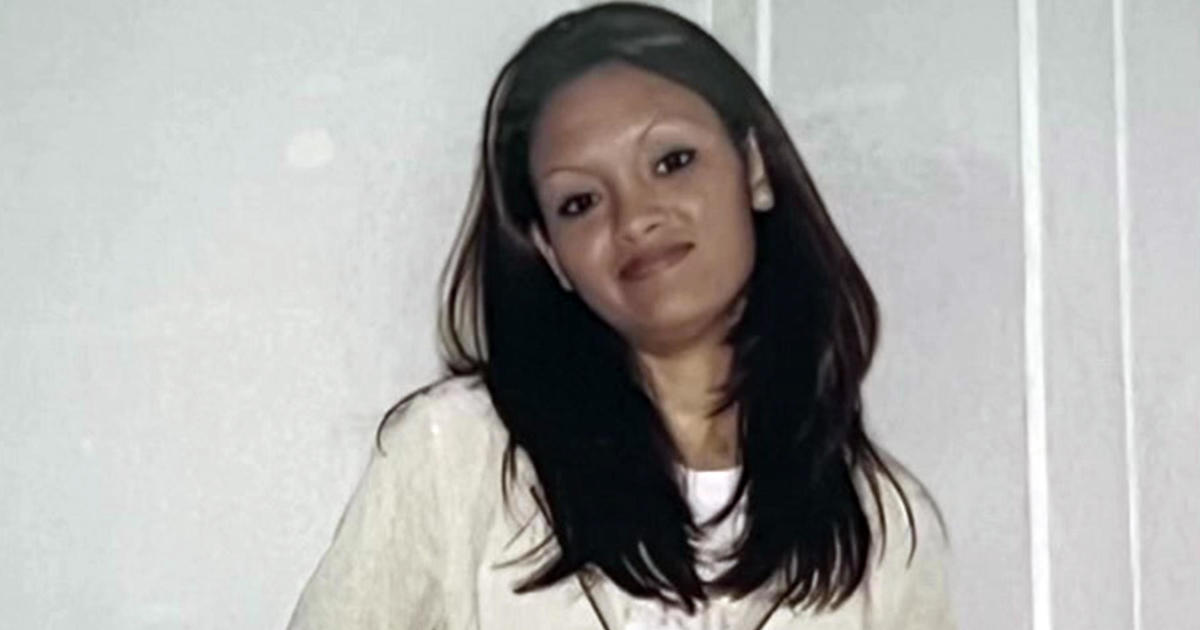
Who killed Marisha Cheong? 11 years later, there are still calls for justice
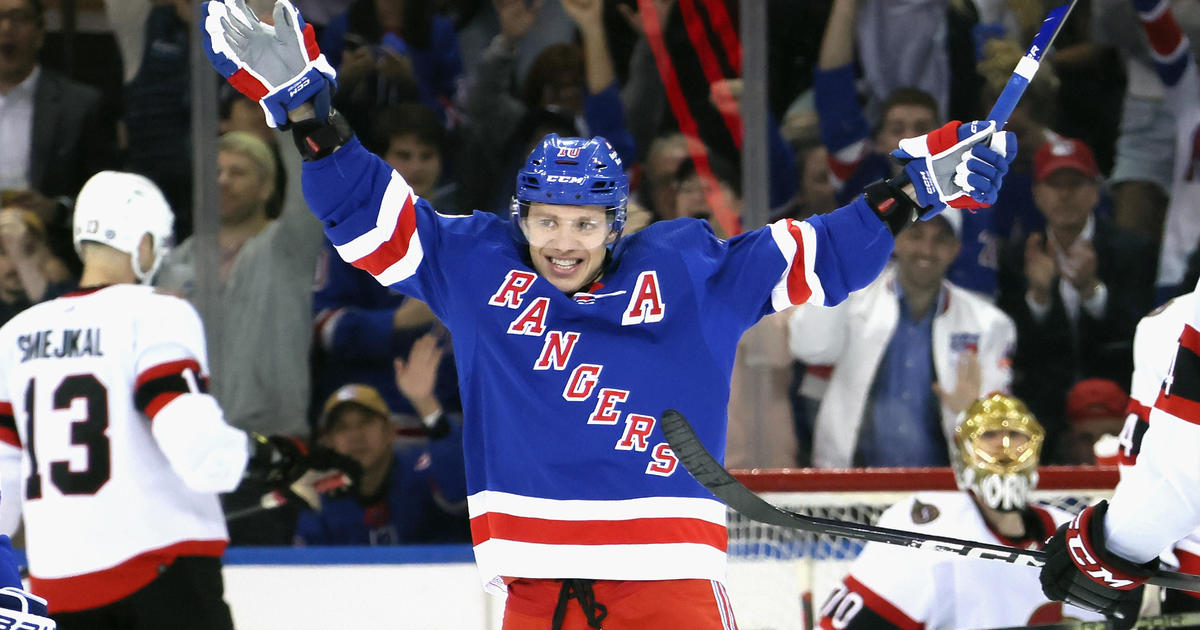
All eyes will be on Artemi Panarin when Rangers open Stanley Cup Playoffs
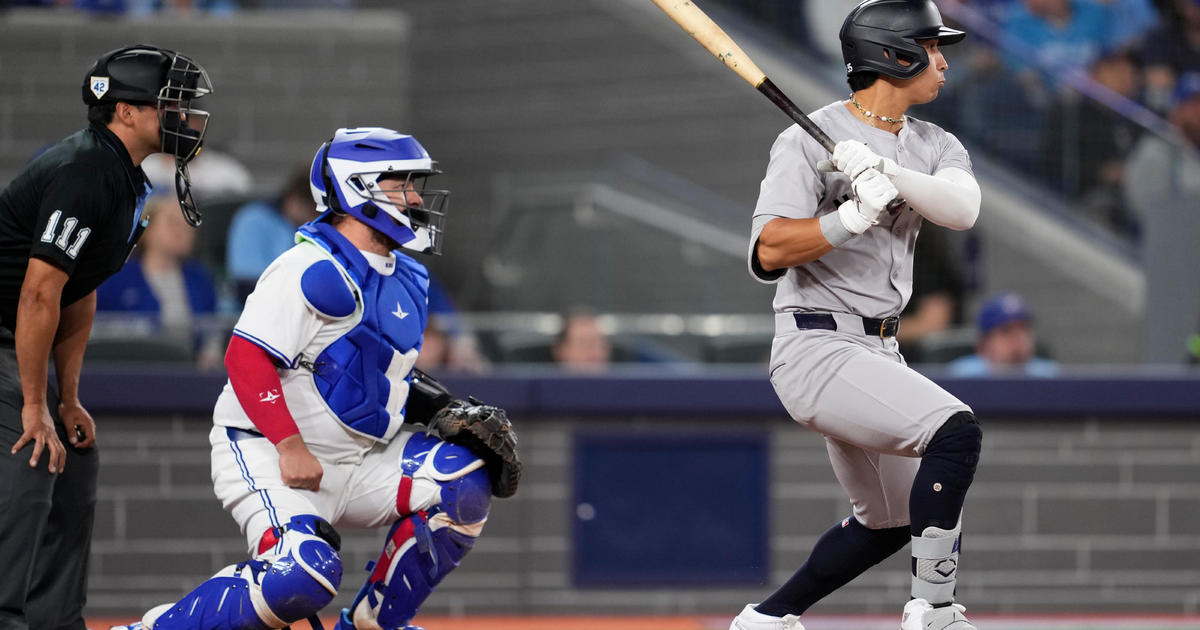
Yankees have no answer for Chris Bassitt, lose to Blue Jays
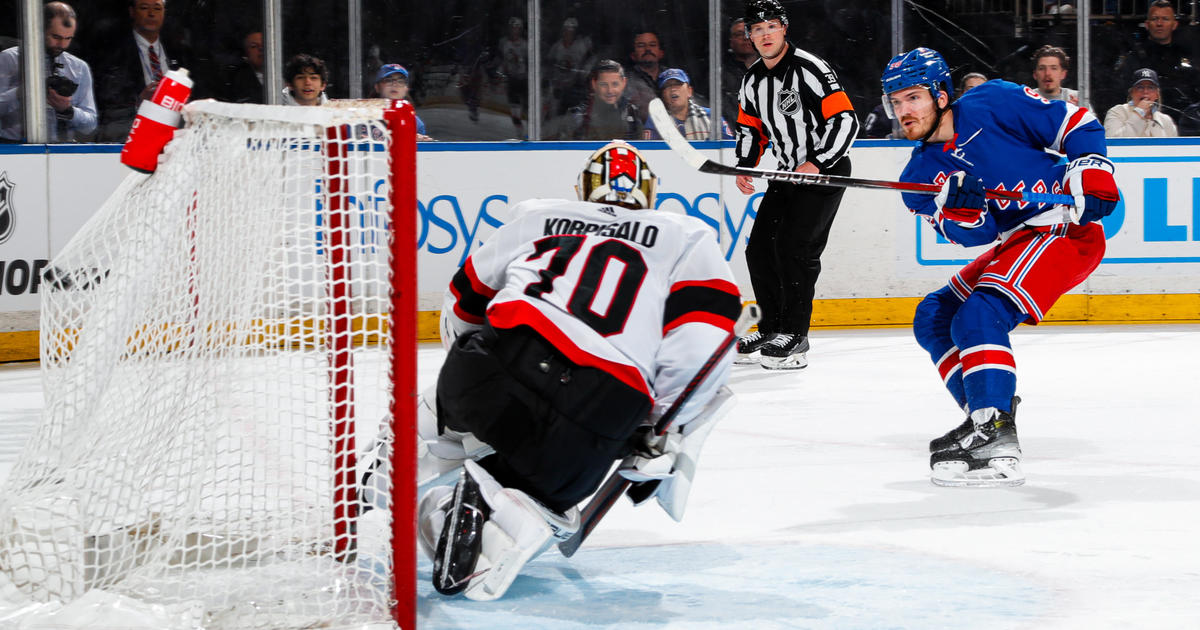
Rangers blank Senators, clinch Presidents' Trophy
- Share full article
Advertisement
Supported by
Armstrong Wins Seventh Tour de France
By Samuel Abt
- July 25, 2005
PARIS, July 24 - Once more, and for the last time, Lance Armstrong swept into Paris on Sunday as the winner and undisputed champion of the Tour de France.
Protected by Discovery Channel teammates on his way to victory and retirement, Armstrong finished the last of 21 daily stages and mounted his final podium after a day of intermittent cold rain, which prompted officials to stop the timer once the main pack entered Paris and declare Armstrong the winner.
On the podium, Armstrong stood with his son, Luke, nearly 6, and twin daughters, Isabelle and Grace, 3. The girls wore yellow dresses to go with their father's jersey while Luke was in blue with a yellow logo.
In a brief speech after a French military band played "The Star-Spangled Banner" and the American flag was raised on the Champs-Élysées, Armstrong praised the two riders flanking him on slightly lower steps, Ivan Basso and Jan Ullrich. Basso, the Italian leader of CSC, finished second by 4 minutes 40 seconds and Ullrich of Germany and T-Mobile was third, 6:21 behind.
"It's really a dream podium," Armstrong said. He called Basso "not only my rival but a special person. It's tough to race against a friend."
Basso beamed as he held his young daughter, Domitilla.
Ullrich, who also has a young daughter but left her at home, also earned praise from Armstrong, who then thanked his teammates, team officials and a host of others. "Vive le Tour," Armstrong concluded. "Forever."
The ceremony had a familiar ring after Armstrong's seventh consecutive victory, but the concluding stage was a rarity.
Instead of the usual mass sprint finish, the 144.5-kilometer, or 90-mile, race from the suburb of Corbeil-Essonnes north into the capital was won in a surprise breakaway by Alexander Vinokourov, a Kazakh with T-Mobile.
He sped away from the 154 other riders with less than two miles to go on the eighth and final circuit on the Champs-Élysées. Registering his second daily victory in this 92nd Tour, Vinokourov easily held off the chasing pack and the two riders nearest him, Bradley McGee, an Australian with Française des Jeux, and Fabian Cancellara, of Switzerland and Fassa Bortolo.
The victory gave Vinokourov 20 bonus seconds, enabling him to move into fifth place over all ahead of Levi Leipheimer, the American leader of Gerolsteiner, by just that margin. Earlier, Vinokourov picked up six bonus seconds in an intermediate sprint, with Leipheimer second, gaining four seconds, as his teammates failed to help him by swarming over the line ahead of Vinokourov.
Vinokourov was timed in 3 hours 40 minutes 57 seconds, a speed of 39.2 kilometers (24 miles) an hour over roads made treacherous by the rain.
Among other crashes, two of Armstrong's teammates and bodyguards, George Hincapie and Yaroslav Popovych, went down just before the race reached Paris and Armstrong had to slither around them, nearly running over Hincapie.
As is the custom, the opening part of the final stage was marked by general hilarity and conversations in the pack. Armstrong even shared a Champagne toast en route with his Discovery Channel team director, Johan Bruyneel, who was driving a car. Neither did more than clink glasses.
Once the hijinks were over, the race turned serious in Paris, with frequent attacks and careful bike handling on the wet cobblestones of the broad Champs-Élysées.
There was a lot at stake even if the final overall victory was not. The fight for the green points jersey was not settled until the finish, with Thor Hushovd, a Norwegian with Crédit Agricole, first; Stuart O'Grady, an Australian with Cofidis, second; and Robbie McEwen, an Australian with Davitamon-Lotto, third.
The climbers' jersey was won by Michael Rasmussen, a Dane with Rabobank and the victim of two crashes and three bicycle changes Saturday in a time trial that sank him to seventh place over all from third place. Second for the climbers' jersey, which is white with red polka dots, was Oscar Pereiro, a Spaniard with Phonak.
Popovych earned the white jersey given to the top rider under 26.
For his labors, Armstrong won $500,000, in addition to a handsome bowl just like the six others at home in Austin, Tex.
Armstrong took no part in the duel at the finish, coasting over his final line with a smile on his face as a crowd estimated at half a million watched.
His time for the 3,593 kilometers, or 2, 233 miles, was 86 hours 15 minutes 2 seconds, a speed of 41.6 kilometers (26.8 miles) an hour. If that seems high considering the many mountains transited, the riders were sometimes pushed by strong tailwinds, the roads are often resurfaced before a stage and bicycles are constantly being improved.
Although this was Armstrong's seventh triumph in the world's toughest bicycle race, it was in many ways simply icing on the cake, as he acknowledges. His sixth victory last year broke the tie he was in with four other dominators: Jacques Anquetil, a Frenchman; Eddy Merckx, a Belgian; Bernard Hinault, another Frenchman; and Miguel Indurain, a Spaniard.
Each was the star of his own decade, beginning with Anquetil in the 1960's. This decade has belonged to Armstrong, who was stricken in 1996 with testicular cancer that spread to his lungs and brain, underwent chemotherapy and brain surgery, and began his comeback in 1998.
The next year he won his first Tour de France. Now he has won his last.
"There was nothing on the line this year, no history, no record, no financial reward, just a promise," he said Saturday to explain his participation. When Discovery Channel signed on as sponsor for three years this season, replacing United States Postal Service, he promised to ride the Tour one more time.
As for his retirement, he said, "Absolutely no regrets."
Cycling Around the Globe
The cycling world can be intimidating. but with the right mind-set and gear you can make the most of human-powered transportation..
Are you new to urban biking? These tips will help you make sure you are ready to get on the saddle .
Whether you’re mountain biking down a forested path or hitting the local rail trail, you’ll need the right gear . Wirecutter has plenty of recommendations , from which bike to buy to the best bike locks .
Do you get nervous at the thought of cycling in the city? Here are some ways to get comfortable with traffic .
Learn how to store your bike properly and give it the maintenance it needs in the colder weather.
Not ready for mountain biking just yet? Try gravel biking instead . Here are five places in the United States to explore on two wheels.
- As it happened: Marianne Vos wins Amstel Gold Race women with bike throw on the line
- Amstel Gold Race men LIVE - Can anyone stop Mathieu van der Poel?
Lance Armstrong: I'd have won the Tour de France if everyone was clean
'We did what we had to do to win'
Lance Armstrong says he and his teams would have won the Tour de France multiple times if the entire peloton was riding clean during his now-stripped reign of seven victories from 1999 through 2005.
Lance Armstrong: Uber investment 'saved' my family
Lance Armstrong to feature in ESPN film series
Lance Armstrong's $1 million Tour Down Under start money confirmed
Lance Armstrong: I wouldn't change a thing
In a wide-ranging interview with NBC Sports as part of the network’s 2019 Tour de France coverage, journalist Mike Tirico interviewed the 47-year-old whose seven Tour de France victories were taken away after the US Anti-Doping Agency's investigation and 2012 "Reasoned Decision" detailing Armstrong’s guilt.
Although Armstrong told Tirico his decision to dope was a mistake, he also said he wouldn't change a thing in his career, and he was proud of the efforts he and his teams put into the Tour preparation outside of their use of performance enhancing drugs.
"What I wish would have happened, I wish kids from Plano and Glenwood Springs, Colorado, and Brooklyn and Montana, as young Americans, if we'd have gone to Europe and everybody was fighting with their fists, we still win," he said. "I promise you that.
"What did we say? We said we worked the hardest, had the best tactics, best team composition, best director, best equipment, best technology, recon the courses. All the things we said, we did. We left out a part, but we did all that stuff. Because now this one thing is part of the story doesn't erase all that. All that happened," Armstrong said. "If you just had this one thing and did none of that, you get last."
When Tirico asked Armstrong to recall why he and many of his US cohorts decided to use performance enhancing drugs, the Texan said it was their belief that they needed to dope to compete in Europe.
"That wasn't just a feeling, that was a fact," he said. "I don't want to make excuses for myself that everybody did it or we never could have won without it. Those are all true, but the buck stops with me. I'm the one who made the decision to do what I did, and it was ... I didn't want to go home, man. I was gonna stay.
Get The Leadout Newsletter
The latest race content, interviews, features, reviews and expert buying guides, direct to your inbox!
"I told you earlier, I don't lay down. And it was the wrong decision, but laying down would have been giving up, going home.
"I knew there were going to be knives at this fight, not just fists. I knew there would be knives. I had knives, and then one day, people start showing up with guns. That's when you say, 'Do I either fly back to Plano, Texas, and not know what you're going to do? Or do you walk over to the gun store?' I walked to the gun store. I didn't want to go home.
Armstrong pushed back against claims that he was the ring leader who cajoled others into doping.
"There are a few things that are just not true about the story," he said. "I mean, there's a lot true, but this idea that myself or anybody forced or mandated or encouraged anybody else to cross that line, just isn't true. It's not true. Absolutely not true.
"We did what we had to do to win. It wasn’t legal. It probably wasn't the best decision, but look, we wouldn't have won had we not. But I wouldn't change a thing. I've said that three times. I would not change a thing," Armstrong said, pausing briefly between each word for emphasis.
"Most of my memories, my fondest memories – yeah, I could pick a few race highlights – but boy, I can tell you about the eight-hour day in the Pyrenees previewing Haute de Com in the pouring rain – pffft – the best," he said, tearing up as he spoke.
Armstrong also revealed his first encounters with performance enhancing drugs, a line he said he first crossed in 1991.
"I think I do," Armstrong said when Tirico asked if he remembered his first experience. "There are gateway drugs that maybe they weren’t banned, certainly weren’t detectable or tested for. The easiest way to think about it is, if you think it's going to help you, even if it's not detectable or banned, then you've crossed the line.
"It was probably '91, maybe, at an Italian stage race. And again, it's hard to differentiate, because I believe we weren't given anything banned, but the doctor walked in – and I was in the lead of the race, and I wanted to win the race – and he walked in and I said, 'Give me everything in the bag.' And he just laughed.
"But it was just probably some form of cortizone or, Armstrong said and then trailed off, failing to finish his through. "But the first time I took a legitimately banned substance was '93."

Thank you for reading 5 articles in the past 30 days*
Join now for unlimited access
Enjoy your first month for just £1 / $1 / €1
*Read any 5 articles for free in each 30-day period, this automatically resets
After your trial you will be billed £4.99 $7.99 €5.99 per month, cancel anytime. Or sign up for one year for just £49 $79 €59

Try your first month for just £1 / $1 / €1
Amstel Gold Race Ladies Edition neutralised, shortened after accident ahead of race
Richard Carapaz returns at Amstel Gold Race one month after hard crash
Marianne Vos wins Amstel Gold Race after Lorena Wiebes celebrates too soon
Most Popular
2-FOR-1 GA TICKETS WITH OUTSIDE+
Don’t miss Thundercat, Fleet Foxes, and more at the Outside Festival.
GET TICKETS
BEST WEEK EVER
Try out unlimited access with 7 days of Outside+ for free.
Start Your Free Trial
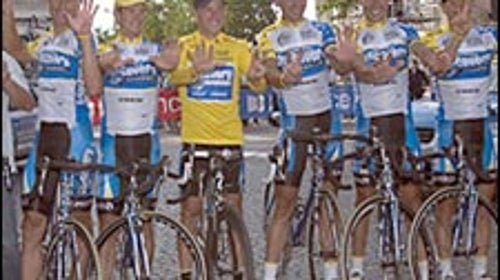
Lance Armstrong Wins Seventh Tour de France
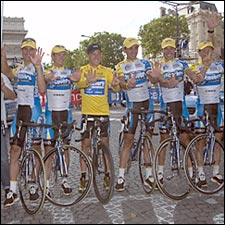
Heading out the door? Read this article on the Outside app available now on iOS devices for members! >","name":"in-content-cta","type":"link"}}'>Download the app .
It’s over. Seven Tours de France in seven years. Eighty-three yellow jerseys. Twenty-one stage victories.
Discovery team portrait
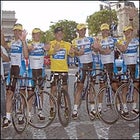
With a smile the size of Texas, Lance Armstrong crossed the finish line in Paris after 86 hours, 15 minutes, and two seconds of riding over 2,242 miles, etching his name into history as the most dominant rider ever in the Tour de France, and leaving his career as a professional cyclist on the zenith of his powers. The 33-year-old took the podium with his three children at his side, kissing his final pair of models, and held his final spoils—the trophy, a bouquet, the saffron stuffed lion, and the yellow jersey he has virtually owned since 1999, the year Armstrong won his first Tour after recovering from testicular cancer. Team CSC’s Ivan Basso finished second, and German Jan Ullrich, Armstrong’s greatest rival over the past seven years, was on his left in third place as the Star-Spangled Banner rang out over the Champs-Elysees. “For me to end a career with this podium is perfect. It’s really a dream podium,” Armstrong told the Outdoor Life Network (OLN), addressing the crowd from the tallest of three awards platforms. He thanked his sponsors and competitors, then alluded to the cavernous hole that will exist in the peloton next year by his retirement. “Ivan, maybe this is your step or Jan, maybe this is yours. I’m out of it, so it’s up to you guys.” Rain on the final day in Paris caused race referees to stop the clock due to fears that the riders would crash en masse on the eight laps and tight turns around the Champs-Elysees. The decision gave Armstrong the victory without the need to ride hard for the finish line. However, after Armstrong won the individual time trial yesterday—his first stage victory of the year—his win was sealed. Armstrong rode part of the day with a glass of champagne in hand, flashing the number seven to the cameras. The referees’ decision to kill the clock didn’t stop the sprinters in their fight for the final stage victory of the Tour. T-Mobile’s Alexandre Vinokourov, the national champion of his native Kazakhstan, who has continually challenged the leaders with bold attacks throughout the Tour, blasted out of the peloton with just under a mile to go. He held off Bradley McGee of Francaise des Jeux and Fassa Bortolo’s Fabian Cancellara to win his second stage of the Tour. Behind him, Thor Hushovd (Credit Agricole) was sprinting to fend off Cofidis’ Stuart O’Grady and Davitamon-Lotto’s Robbie McEwen in the points competition—the only jersey left undecided coming into Paris. Though Hushovd was beaten by both, the lion’s share of points went to Vinokourov, and with 194 collected over the course of the Tour, Hushovd kept the green jersey he has worn since the previous leader, Tom Boonen (Quick-Step), abandoned the race in Stage 12. O’Grady was just behind him with 182 points. Confusion lingered about the overall standings behind Armstrong even after the last riders had crossed the line. With the clock stopped, the referees had originally announced that riders would not be given time bonuses for placing highly in the intermediate sprint to the finish line. That appeared to mean Gerolsteiner’s Levi Leipheimer, who was just 77 hundredths of a second ahead of Vinokourov, had clinched fifth place and there would be no head-to-head sprint between the two elite riders. But the sun came out and dried the course along the Champs-Elyssees over the final laps. After Vinokourov crossed the line, the judges announced that the usual time bonuses would be awarded for the day’s top positions. The critical seconds Vinokourov was awarded for winning the day shot him into fifth, ahead of Leipheimer, who finished sixth. In the overall standings Armstrong beat Basso by 4:40, the second slimmest margin of his seven Tour victories. Ullrich was 6:21 behind in third, and Illes Balear’s Francisco Mancebo finished 9:59 back. After a powerful showing in the Alps and Pyrenees, riding with and even ahead of Armstrong through the mountain stages, Mickael Rasmussen won the polka dot climber’s jersey. Discovery Channel’s Yaroslav Popovych was awarded the white jersey for the best young rider. The award for the most combatitive rider of the race was given to Oscar Pereiro (Phonak) who launched the most aggressive attacks, winning one stage and finishing close in several others. He finished 10th overall. T-Mobile, the team boasting the likes of Ullrich, Vinokourov, and Andreas Kloden, who abandoned in Stage 17 with a broken wrist, won the overall team competition, finishing with a cumulative 14:57 ahead of Armstrong’s Discovery Channel team.
Popular on Outside Online

Enjoy coverage of racing, history, food, culture, travel, and tech with access to unlimited digital content from Outside Network's iconic brands.
Healthy Living
- Clean Eating
- Vegetarian Times
- Yoga Journal
- Fly Fishing Film Tour
- National Park Trips
- Warren Miller
- Fastest Known Time
- Trail Runner
- Women's Running
- Bicycle Retailer & Industry News
- FinisherPix
- Outside Events Cycling Series
- Outside Shop
© 2024 Outside Interactive, Inc

IMAGES
VIDEO
COMMENTS
Lance Edward Armstrong (né Gunderson; born September 18, 1971) is an American former professional road racing cyclist.He achieved international fame for winning the Tour de France a record seven consecutive times from 1999 to 2005, but was stripped of his titles after an investigation into doping allegations, called the Lance Armstrong doping case, found he used performance-enhancing drugs ...
Lance Armstrong, né Lance Edward Gunderson le 18 septembre 1971 à Plano (), est un coureur cycliste américain, champion du monde sur route en 1993.Surnommé « le boss », il est célèbre pour avoir remporté sept Tours de France consécutifs de 1999 à 2005 — ce qui constituait le record absolu dans cette épreuve — et pour se les être vu retirer en 2012 pour plusieurs infractions à ...
On July 24, 2005, American cyclist Lance Armstrong wins a record-setting seventh consecutive Tour de France and retires from the sport. After Armstrong survived testicular cancer, his rise to ...
Palmarès de Lance Armstrong - Résultats et classements Palmarès sur le Tour de France - 7 fois vainqueur du Tour de France ( 2005 *, 2004 *, 2003 *, 2002 *, 2001 *, 2000 *, 1999 *)
Lance Armstrong (born 1971-09-18 in Plano) is a former professional road racing cyclist from United States, active between 1989 and 2011. His best results are winning World Championships and winning Donostia San Sebastian Klasikoa.
In 2001, Armstrong added the Tour of Switzerland to his palmares and moved to the top of the UCI rankings, before winning the Tour de France for the third consecutive time with four stage wins ...
Mar. 16, 2024, 12:56 AM ET (CNN) Lance Armstrong says that he experienced PTSD and had intensive therapy - 'all alone, one-on-one, 10 hours a day'. Lance Armstrong (born September 18, 1971, Plano, Texas, U.S.) American cyclist, who was the only rider to win seven Tour de France titles (1999-2005) but who was later stripped of all his ...
Lance Armstrong has 44 career victories. The biggest victories were World Championships in 1993 and Tour de Suisse in 2001. ... Tour de France | Stage 18: 1995-07-21: ME: 14: West Virginia Classic: 1995-05-28: ME: 13: West Virginia Classic | Stage 4: 1995-05-26: ME: 12: Tour DuPont:
On October 22, 2012, Lance Armstrong is formally stripped of the seven Tour de France titles he won from 1999 to 2005 and banned for life from competitive cycling after being charged with ...
Lance Armstrong's U.S. Postal Service team had made unsuccessful attempts in 2000, 2001 and 2002 to win the team time-trial discipline, and the team was ready to rally in 2003.
PARIS — Lance Armstrong closed out his amazing career with a seventh consecutive Tour de France victory today — and did it a little earlier than expected. Because of wet conditions, race ...
PARIS, July 24 - Once more, and for the last time, Lance Armstrong swept into Paris today as the winner and undisputed champion of the Tour de France.
Lance Armstrong is a cancer survivor and former professional cyclist who was stripped of his seven Tour de France wins due to evidence of performance-enhancing drug use. Updated: Apr 23, 2021 ...
Tech feature: Lance Armstrong's Tour de France-winning machines, August 2, 2007. At just 24 years old, Discovery Channel's Alberto Contador is among the youngest riders to win the Tour de France ...
Lance Armstrong's last, best shot at Tour de France glory was a good one. It had a chance at being a great one. On the first climb of the five-mountain, 210-kilometer Stage 16, Armstrong helped ...
It ended a protracted legal battle that involved former teammate Floyd Landis and the US government on behalf of the US Postal Service, Armstrong's Tour de France team sponsor from 1999 through ...
Lance Armstrong's competitive cycling career ends Sunday on the streets of Paris with a seventh straight Tour de France victory. The American racing legend says he will retire at age 33.
June 28, 2013 / 12:31 PM EDT / CBS New York. The dirty past of the Tour de France came back on Friday to haunt the 100th edition of cycling's showcase race, with Lance Armstrong telling a ...
Armstrong Wins Seventh Tour de France. By Samuel Abt. July 25, 2005. PARIS, July 24 - Once more, and for the last time, Lance Armstrong swept into Paris on Sunday as the winner and undisputed ...
A globally-known cyclist and endurance athlete, Lance remains passionate about the benefits of an active lifestyle. Through his decades of competitive racing...
Tom Boonen and Lance Armstrong on the start line of stage 8 at the 2005 Tour de France (Image credit: Tim de Waele/Getty Images Sport) Lance Armstrong rides in the La Ruta de Los Conquistadores on ...
It's over. Seven Tours de France in seven years. Eighty-three yellow jerseys. Twenty-one stage victories. With a smile the size of Texas, Lance Armstrong crossed the finish line in Paris after ...
Le palmarès du Tour de France se compose de l'ensemble des résultats des 110 éditions de cette course par étapes organisée pour la première fois en 1903.La première édition du Tour est remportée par Maurice Garin.Par la suite, quatre coureurs parviennent à remporter cinq fois l'épreuve : Jacques Anquetil, Eddy Merckx, Bernard Hinault et Miguel Indurain, tandis que Christopher Froome ...